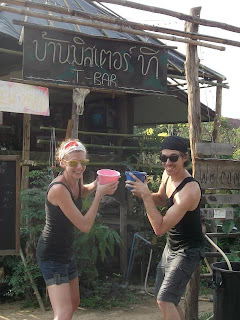Trash cans full of water line the roads
from which groups of people continually slosh water over
passers-by. Entire families ride around in the backs of trucks,
dumping buckets over people indiscriminately. It's not uncommon to
see full-grown adults wielding water-pistols, squirting even the most
unsuspecting of people without so much as a second thought. It's
impossible to set foot out your door without getting completely
drenched—which isn't necessarily a bad thing because it's also the
hottest time of the year, with temperatures most days easily reaching
100 degrees Fahrenheit.
 |
| Gearing up and preparing to go into battle |
Though this holiday is certainly among the
most bizarre we've experienced, it's roots are far more tame than
current practice would lead you to believe. Historically—in fact,
exclusively up until recently—people would celebrate Songkran by
visiting their relatives, sharing meals and offering one another well
wishes for the coming year. During these visits, it was customary
for people to rinse clean the shrines in their relatives' yards, and
also to pour a small amount of water over the feet of their elders,
symbolically washing away the misdeeds of the previous year, and
preparing them for the one to come. How exactly things evolved from
there to the mandatory participation water wars that punctuate
Songkran today, one can only guess. But however it came about, one
thing is for certain: everyone celebrates, and everyone
gets wet!
Here in Pai, we kicked off the New Year with a party for the kids at the Banyan Center. The first day of
Songkran happened to fall on our last day of summer camp, so we
invited the families to join us for some “celebrating.” We set up
our station at the front gate and threw on our suits. All of our
guests received a 'warm welcome' as they approached the school, and
before long everyone was feeling cool and refreshed. The kids had a
ball flinging cups of water on people as they passed by, and the yard
was filled with their squeals and giggles (and maybe a few of ours,
too) throughout the afternoon.
Over the next few days, we posted up
with friends at various places around town, hanging out, relaxing,
and 'preparing' other Pai residents—and occasionally each other—for
the New Year. Admittedly, many people don't seem at all pleased about
Songkran, or about getting water thrown at them, so we chose the
'friendly plan of attack' and tried not to dump water on people who
appeared not to want it, however I can't say the same for everyone
else. In fact, many people (Thais and foreigners alike) seem to view
the holiday as an opportunity to take out their aggression in the
name of “good fun”, and it's undeniable that some people take it
too far. Every year throughout Thailand there are a stunning number
of deaths related to Songkran, most of them occurring on roads and attributed to
wet pavement, an inability to see, or the sheer force of the water
causing an accident.
 We've found that the best approach to
Songkran is to drive slowly, keep all of our electronics safely
double bagged, and just surrender ourselves to getting soaked.
There's absolutely no point in trying to stay dry when, with every
store you pass and every truck that drives by, you're more than likely
going to have a bucket of water aimed at you. And make no mistake,
we've done our fair share of songkran-ing ourselves! I mean, what's
travel about if not participating in what's going on in the culture
around you? ;)
We've found that the best approach to
Songkran is to drive slowly, keep all of our electronics safely
double bagged, and just surrender ourselves to getting soaked.
There's absolutely no point in trying to stay dry when, with every
store you pass and every truck that drives by, you're more than likely
going to have a bucket of water aimed at you. And make no mistake,
we've done our fair share of songkran-ing ourselves! I mean, what's
travel about if not participating in what's going on in the culture
around you? ;) 





RIDICULOUS! HAHAHAHHA
ReplyDelete